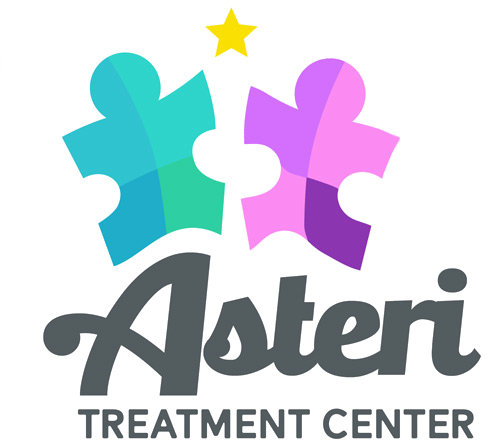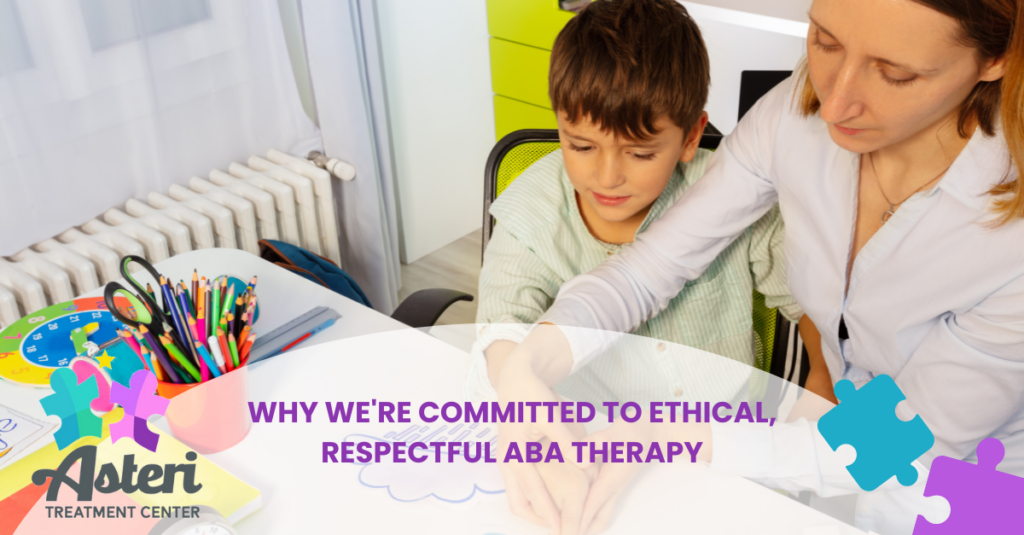When parents first hear about Applied Behavior Analysis (ABA) therapy, they often arrive with a mix of hope and uncertainty. Perhaps a pediatrician recommended it, or maybe a teacher suggested it could help their child succeed in school. Whatever brought you here, you deserve to know exactly what kind of ABA therapy your child will receive—and more importantly, how it will respect both your child’s unique needs and your family’s values.
ABA therapy has evolved significantly over the decades, moving from outdated approaches toward more compassionate, individualized methods. However, not all ABA providers have made this transition. Some still rely on rigid protocols that fail to consider the whole child or the family’s cultural background. Others may prioritize compliance over genuine learning and growth.
At Asteri Treatment Center, we believe ABA therapy should do more than change behaviors—it should honor your child’s individuality, celebrate their strengths, and respect the values that make your family unique. This isn’t just a philosophy we talk about in meetings; it’s the foundation of every assessment, every session, and every milestone we celebrate with your family.
Our Foundation: Respect for Every Child’s Journey
No two children are exactly alike. This truth guides everything we do, from the moment we meet your family through every step of your child’s progress. While some ABA programs follow cookie-cutter approaches, we recognize that what works for one child may not work for another.
Every child brings their own personality, interests, learning style, and communication preferences. Some children thrive with visual supports, while others respond better to hands-on activities. Some need more time to process information, while others are ready to move quickly between tasks. Our job isn’t to force children into predetermined molds—it’s to understand how each child learns best and design interventions that build on their natural strengths.
This individualized approach extends beyond learning preferences. We also consider each child’s sensory needs, emotional regulation patterns, and social communication style. Rather than viewing these as obstacles to overcome, we see them as important pieces of information that help us create more effective and respectful interventions.
Honoring Family Culture and Values
It’s important to note that this process is different for every child, for every family. At Asteri Treatment Center, we place a special emphasis on the family’s culture. Every culture has different values, what they live by, traditions, characteristics, and more. By upholding those, we’re able to provide a more empathetic and effective assessment for your child.
Culture shapes how families communicate, celebrate achievements, handle challenges, and define success. It influences everything from daily routines to long-term goals. When ABA therapy ignores these cultural foundations, it can create disconnect between home and therapy environments, making progress more difficult and less meaningful.
Our culturally responsive approach means we take time to understand what matters most to your family. We learn about your traditions, communication styles, and values before designing any intervention plan. This might mean incorporating your family’s preferred language into sessions, respecting religious practices, or understanding cultural perspectives on independence and family relationships.
Building Cultural Bridges, Not Barriers
Some families worry that ABA therapy will try to change fundamental aspects of their child’s identity or cultural expression. We believe the opposite should be true. Effective ABA therapy should help children communicate more effectively within their cultural context, not replace it with unfamiliar expectations.
For example, if your family values collective decision-making, we won’t push your child toward hyper-independence that conflicts with family dynamics. Instead, we’ll focus on building communication skills that help your child participate meaningfully in family discussions and cultural activities.
Modern ABA: Moving Beyond Compliance
Traditional ABA approaches sometimes focused heavily on compliance—teaching children to follow instructions without question. While following directions has its place, modern ethical ABA recognizes that blind compliance isn’t the goal. Instead, we focus on building genuine understanding, communication skills, and problem-solving abilities.
This means we celebrate when children ask questions, express preferences, or suggest alternative ways to complete tasks. We teach self-advocacy skills alongside academic and social skills. We help children understand the “why” behind expectations rather than simply demanding compliance.
Collaborative Goal Setting
Your family’s priorities guide our intervention planning. Rather than presenting you with a predetermined list of goals, we engage in collaborative discussions about what matters most for your child’s future. Perhaps communication is the top priority, or maybe social skills for school success. Some families focus on independence skills, while others emphasize emotional regulation.
These conversations happen regularly, not just during initial assessments. As your child grows and your family’s needs evolve, our goals and approaches evolve too. This flexibility ensures that ABA therapy remains relevant and meaningful throughout your child’s development.
Ethical Practices in Daily Sessions
Ethical ABA therapy looks different in practice than outdated approaches. Our therapists receive ongoing training in trauma-informed care, neurodiversity-affirming practices, and culturally responsive interventions. They understand that their job is to support and empower children, not control them.
In practical terms, this means sessions include plenty of breaks, respect for sensory needs, and attention to each child’s emotional state. If a child is having a difficult day, we adjust our approach rather than pushing through rigid programming. We use positive reinforcement thoughtfully, focusing on intrinsic motivation rather than external rewards whenever possible.
Transparency and Communication
Ethical ABA therapy requires ongoing communication between families and providers. You should always understand what’s happening in sessions, why specific strategies are being used, and how decisions about your child’s program are made. We provide regular updates, welcome questions, and encourage family involvement in ways that work for your schedule and comfort level.
We also believe in data transparency. While data collection is important for tracking progress, we share this information in meaningful ways that help families understand their child’s growth. Numbers on a chart matter less than real-world improvements in communication, learning, and quality of life.
Creating Lasting, Meaningful Change
The ultimate goal of ethical ABA therapy isn’t perfect behavior or blind compliance. It’s helping children develop skills that improve their quality of life, strengthen family relationships, and support their long-term success and happiness.
This might look different for every family. For some children, success means improved communication that helps them express their needs and wants. For others, it’s developing social skills that lead to meaningful friendships. Some families celebrate increased independence, while others focus on emotional regulation that makes family life more peaceful.
Whatever success looks like for your family, ethical ABA therapy should help you get there while honoring your child’s individuality and your family’s values. The journey should feel collaborative, respectful, and hopeful.
Moving Forward Together
Choosing ABA therapy represents a significant decision for your family. You deserve providers who see your child as a whole person, respect your family’s cultural values, and commit to ethical practices that prioritize your child’s wellbeing above all else.
If you’re considering ABA therapy for your child, we encourage you to ask potential providers about their approaches to individualization, cultural responsiveness, and ethical practices. The right provider will welcome these conversations and share specific examples of how they put these values into practice.
At Asteri Treatment Center, we’re committed to continuing this important work. ABA therapy has incredible potential to support children and families, but only when it’s delivered with respect, compassion, and genuine commitment to each child’s unique journey.

